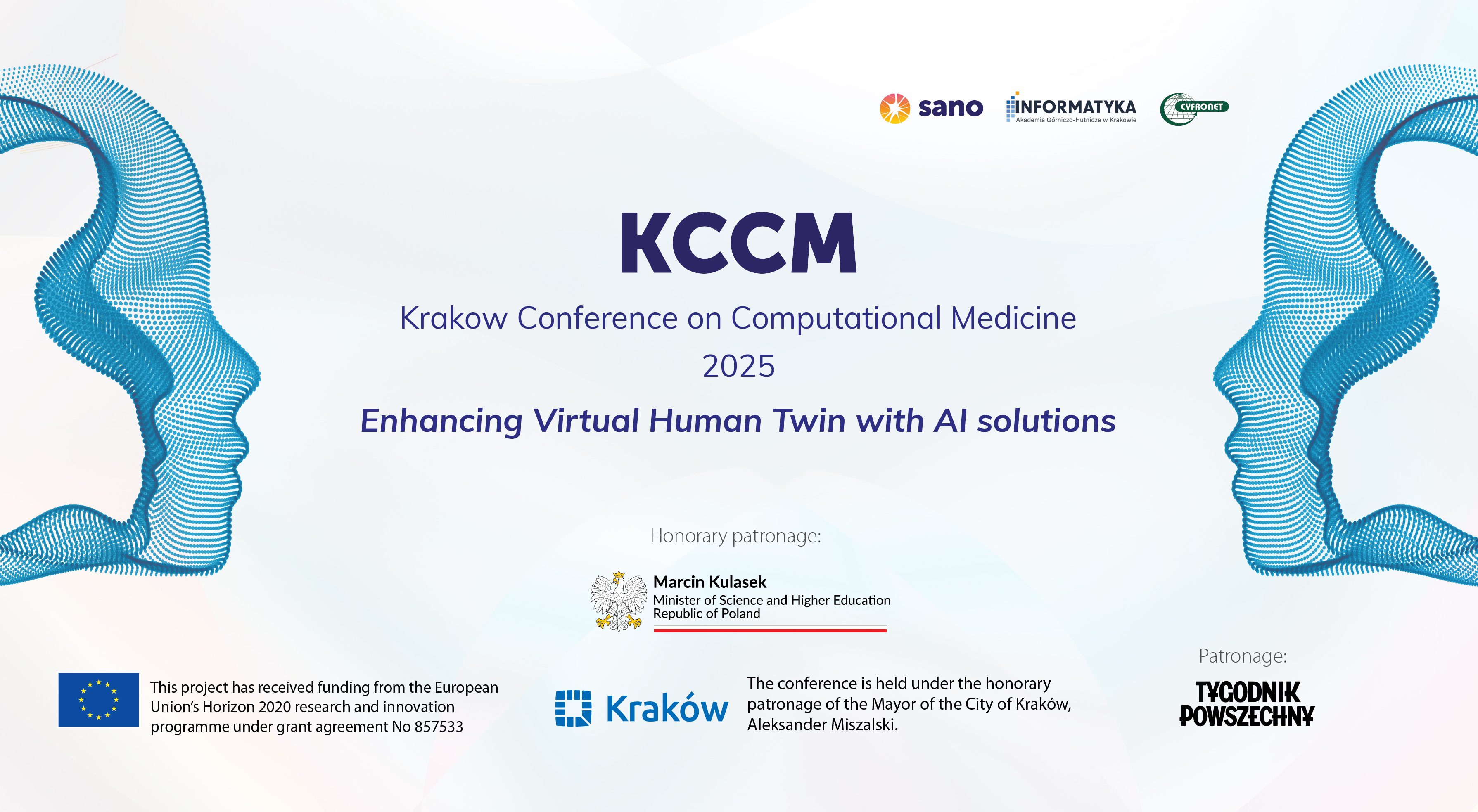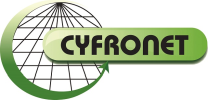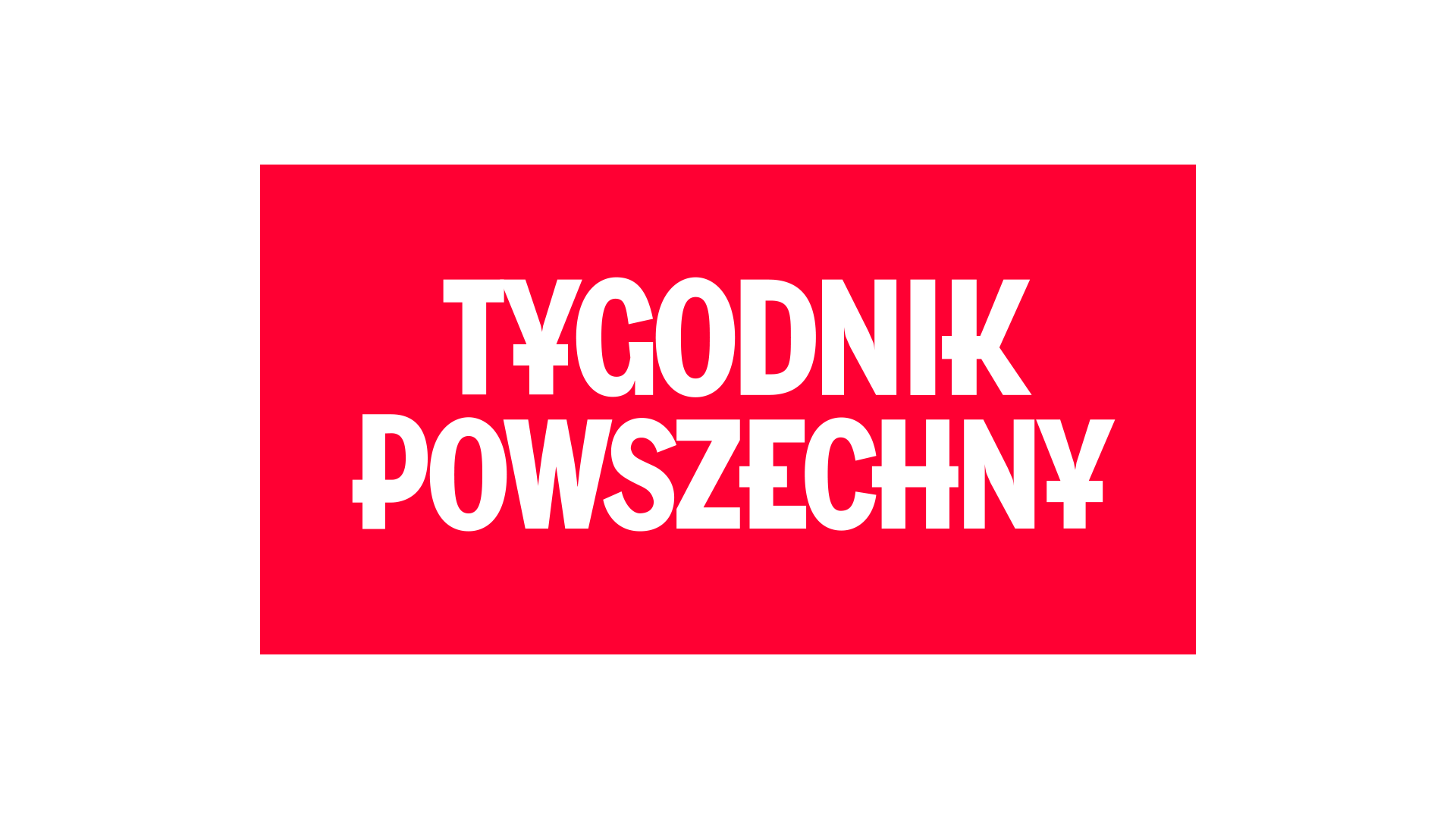Krakow Conference on Computational Medicine 2025
room 1.19 and 1.20
🌍 Venue: Faculty of Computer Science AGH, Kraków

The conference’s motto is “Enhancing Virtual Human Twin with AI solutions“. Personalised medicine, focusing on the development of in silico methods to replace in vivo and in vitro approaches, should make more effective use of the solutions brought about by the AI revolution, based on machine learning and data analysis methods—perceived not as competitive, but as supportive of existing modelling and simulation techniques.
Given the organisers’ expertise in both computer simulation and artificial intelligence, the Conference will offer an excellent opportunity to foster greater interaction between communities working in these two fields. Computer technologies and high-performance computing are of key importance to progress in computational medicine. Therefore, an additional advantage of the Conference will be the inclusion of technical aspects related to the use of new computing infrastructures.
The organisation of the Conference is the result of the experience gained by the Sano team during Sano Science Day (2023, 2024), through cooperation in the Life Science Open Space initiative (since 2019), as well as the extensive experience of the Faculty of Computer Science at AGH and the Academic Computer Centre Cyfronet AGH in this field.
Conference topics include
- Mathematical medical models
- Multiscale modelling
- Computational modelling of organs and diseases
- Patient data management and processing
- Methods of acquisition, storage and retrieval of information in medicine
- Analysis of medical images
- Machine learning models for healthcare
- Computer simulations using advanced computing infrastructures
- Surgical planning tools
- Model and simulation reproducibility and credibility
- Clinical decision support systems based on artificial intelligence
- Towards the Virtual Human Twin platform
- Ethical, legal, and social issues in VHT
Keynote Lectures
Ewa Deelman - University of Southern California
Liesbet Geris – University of Liège, KU Leuven & VPH Institute
Tomasz Gosiewski - Jagiellonian University Medical College
Alfons Hoekstra – University of Amsterdam
Joanna Jaworek-Korjakowska – AGH University
Emiliano Ricciardi – IMT School for Advanced Studies Lucca
Daniel Taylor – University of Sheffield
Organisers
 |
|  |
| Sano Centre for Computational Medicine, Kraków Poland | Faculty of Computer Science AGH Krakow, Poland | Academic Computer Centre Cyfronet AGH, Krakow, Poland |
Honorary patronage


The conference is held under the honorary patronage of the Mayor of the City of Kraków, Aleksander Miszalski.
Media patronage

Registration and fee
No registration fee, conference by invitations
Important dates
Deadline for abstracts – 21 August
Acceptance of abstracts – 2 September
Start of registration – 29 August
Deadline for registration of authors – 10 September
Registration closed – 30 September
Regulations

-
-
Tutorial: BRAIN-GUT Sano Centre, Kraków
Sano Centre, Kraków
Czarnowiejska 36, C5 -
Tutorial: HPC CYFRONET
CYFRONET
Academic Computer Centre CYFRONET of the AGH University of Krakow Nawojki 11 street 30-950 Kraków -
Tutorial: VR Sano Centre, Kraków
Sano Centre, Kraków
Czarnowiejska 36, C5 -
Tutorial: LEGAL Sano Centre, Kraków
Sano Centre, Kraków
Czarnowiejska 36, C5 -
Tutorial: CACTUS Sano Centre, Kraków
Sano Centre, Kraków
Czarnowiejska 36, C5 -
Tutorial: VVUQ CYFRONET
CYFRONET
Academic Computer Centre CYFRONET of the AGH University of Krakow Nawojki 11 street 30-950 Kraków
-
-
-
R: Registration room 1.19 and 1.20
room 1.19 and 1.20
🌍 Venue: Faculty of Computer Science AGH, Kraków
Kawiory 21, Kraków -
O: Opening room 1.19 and 1.20
room 1.19 and 1.20
🌍 Venue: Faculty of Computer Science AGH, Kraków
Kawiory 21, Kraków -
K1: Keynote 1 room 1.19 and 1.20
room 1.19 and 1.20
🌍 Venue: Faculty of Computer Science AGH, Kraków
Kawiory 21, KrakówConvener: Marian BUBAK (Sano - Centre for Computational Personalized Medicine)-
1
Building the Virtual Human Twin: from an engaged ecosystem to an incipient infrastructureSpeaker: Liesbet GERIS (University of Liège, KU Leuven & VPH Institute)
-
1
-
PS: Poster session room 1.19 and 1.20
room 1.19 and 1.20
🌍 Venue: Faculty of Computer Science AGH, Kraków
Kawiory 21, KrakówConvener: Marian BUBAK (Sano - Centre for Computational Personalized Medicine)-
2
Development of a Diagnostic Decision-Support System for Allergic Diseases at the Voivodeship Rehabilitation Hospital for Children in AmerykaSpeaker: Paulina TWOREK (Sano Centre for Computational Medicine)
-
3
Interpretable Machine Learning for Glioma Grading from HLA-DR–Stained Whole-Slide Images: Multi-Feature Analysis with SHAPSpeaker: Monika PYTLARZ (Sano Centre for Computational Medicine)
-
4
Application of Deep Learning to Quantify Brain MicrostructureSpeaker: Dominika CIUPEK (Sano Centre for Computational Medicine)
-
5
Beyond Accuracy: Assessing the Impact of EEG Denoising on the Diagnostic Utility of a Pre-Hospital Stroke Triage ModelSpeaker: Rosmary BLANCO (Sano Centre for Computational Medicine)
-
6
Sharp-to-Soft CT Kernel Conversion Using Quaternion and Variational Decomposition ModeSpeaker: Mahmoud NASR (Sano Centre for Computational Medicine)
-
7
Realistic Endoscopic Synthetic Dataset Generation Through Surgical Simulation and Diffusion ModelsSpeaker: Sabina MARTYNIAK (Sano Centre for Computational Medicine)
-
8
Dynamic Profiling of the Sinonasal Microbiome Using Nanopore Sequencing in the Diagnosis of Chronic RhinosinusitisSpeaker: Sylwia BOŻEK (Sano Centre for Computational Medicine)
-
9
Aggregating gut: on the link between neurodegeneration and bacterial functional amyloidsSpeaker: Alicja WOJCIECHOWSKA (Sano Centre for Computational Medicine)
-
10
Towards Trustworthy Digital Twins in Healthcare: VVUQ Activities in the GEMINI ProjectSpeaker: Karol ZAJĄC (Sano - Centre for Computational Personalized Medicine)
-
11
Research Data Sharing Incentivisation ToolkitSpeaker: Taras ZHYHULIN (Sano Centre for Computational Medicine)
-
2
-
10:35
Coffee break and posters
-
K2: Keynote 2 room 1.19 and 1.20
room 1.19 and 1.20
🌍 Venue: Faculty of Computer Science AGH, Kraków
Kawiory 21, KrakówConvener: Aleksander BYRSKI (AGH University)-
12
Artificial Intelligence in Orthodontics: From Automated Diagnostics to Personalized TreatmentSpeaker: Joanna JAWOREK-KORJAKOWSKA (AGH University)
-
12
-
CT1: 4 Contributed talks room 1.19 and 1.20
room 1.19 and 1.20
🌍 Venue: Faculty of Computer Science AGH, Kraków
Kawiory 21, KrakówConvener: Aleksander BYRSKI (AGH University)-
13
Augmenting not replacing: preparing the future health workforce for the digital tools revolution in clinical reasoningSpeaker: Andrzej KONONOWICZ (Jagiellonian University Medical College)
-
14
LLM-based psychological digital twins in social research: opportunities and dangersSpeaker: Paweł SOBKOWICZ (Sano Centre for Computational Medicine)
-
15
Personalizing Dyslexia Interventions with a Virtual Cognitive Twin FrameworkSpeaker: Suvarna REKHA CHINTA (Jagiellonian University)
-
16
On-Device Radiotherapy Simulation: Secure Computing in Your BrowserSpeaker: Konrad MICHALIK (AGH University)
-
13
-
13:00
Lunch and posters
-
K3: Keynote 3 room 1.19 and 1.20
room 1.19 and 1.20
🌍 Venue: Faculty of Computer Science AGH, Kraków
Kawiory 21, KrakówConvener: Jan ARGASIŃSKI (Sano Centre for Computational Personalised Medicine)-
17
Modeling the Sensory-Deprived Brain: Insights from Neuroimaging, Computational Neuroscience, and Machine LearningSpeaker: Emiliano RICCIARDI (IMT School for Advanced Studies Lucca)
-
17
-
CT2: 4 Contributed talks room 1.19 and 1.20
room 1.19 and 1.20
🌍 Venue: Faculty of Computer Science AGH, Kraków
Kawiory 21, KrakówConvener: Jan ARGASIŃSKI (Sano Centre for Computational Personalised Medicine)-
18
Extracting eye movement information from fMRI imagesSpeaker: Cemal KOBA (Sano Centre for Computational Personalised Medicine)
-
19
New approaches to bioinformatics analysis in Leiden University Medical Center: bone marrow transplant in Thalasemia patients.Speaker: Katarzyna JURKOWSKA (AGH University)
-
20
Exploring EEG Features Structure for Neuroscreening: A Study of Dimensionality Reduction TechniquesSpeaker: Maja MARZEC (University of Warsaw)
-
21
Towards the Development of Non-Invasive Electrical Impedance Spectroscopy-based Oral Cancer Diagnosis SystemSpeaker: Malwina MATELLA (The University of Sheffield)
-
18
-
16:00
Coffee break and posters room 1.19 and 1.20
room 1.19 and 1.20
🌍 Venue: Faculty of Computer Science AGH, Kraków
Kawiory 21, Kraków -
K4: Keynote 4 room 1.19 and 1.20
room 1.19 and 1.20
🌍 Venue: Faculty of Computer Science AGH, Kraków
Kawiory 21, KrakówConvener: Katarzyna RYCERZ (AGH University)-
22
Computing coronary physiology: Conception, Optimisation and Clinical applicationSpeaker: Daniel TAYLOR (University of Sheffield)
-
22
-
CT3: 4 Contributed talks room 1.19 and 1.20
room 1.19 and 1.20
🌍 Venue: Faculty of Computer Science AGH, Kraków
Kawiory 21, KrakówConvener: Katarzyna RYCERZ (AGH University)-
23
Portable Auscultation Device for Perfusion Evaluation - 5PAudio, a novel personalized Monitoring and Prediction approachSpeaker: Hamza ORAN (AGH University)
-
24
Preliminary Evaluation of Virtual Reality Simulator for Surgery Training in International Medical StudentsSpeaker: Przemyslaw KORZENIOWSKI (Sano Centre for Computational Medicine)
-
25
Decoder Conditioning with Tabular Data for Enhanced 3D Image SegmentationSpeakers: Tomasz SZCZEPAŃSKI (Sano Centre for Computational Personalized Medicine), Michal K. GRZESZCZYK (Sano Centre for Computational Personalized Medicine), Szymon PŁOTKA (Sano Centre for Computational Personalized Medicine)
-
26
Advancing quality assurance of ion beam radiotherapy for cancersSpeaker: Leszek GRZANKA (AGH University)
-
23
-
18:30
Conference dinner room 1.19 and 1.20
room 1.19 and 1.20
🌍 Venue: Faculty of Computer Science AGH, Kraków
Kawiory 21, Kraków
-
-
-
R: Registration room 1.19 and 1.20
room 1.19 and 1.20
🌍 Venue: Faculty of Computer Science AGH, Kraków
Kawiory 21, Kraków -
K5: Keynote 5 room 1.19 and 1.20
room 1.19 and 1.20
🌍 Venue: Faculty of Computer Science AGH, Kraków
Kawiory 21, KrakówConvener: Maciej MALAWSKI (Sano Centre for Computational Medicine)-
27
Towards Digital Twins for Cerebral Blood Flow and Perfusion PathologiesSpeaker: Alfons HOEKSTRA (University of Amsterdam)
-
27
-
CT4: 3 Contributed talks room 1.19 and 1.20
room 1.19 and 1.20
🌍 Venue: Faculty of Computer Science AGH, Kraków
Kawiory 21, KrakówConvener: Maciej MALAWSKI (Sano Centre for Computational Medicine)-
28
Digital Twin-Based Prognostic Modeling in Aortic Coarctation and Hypoplastic Aortic ArchSpeaker: Krystian JĘDRZEJCZAK (Warsaw University of Technology)
-
29
Towards personalised dynamic models of the cardiovascular systemSpeaker: Karolina TLAŁKA (Sano Centre for Computational Medicine)
-
30
Comparison of MRI-derived Cardiac Power with and without Deep Learning AccelerationSpeaker: Grace FAULKNER (University of Sheffield)
-
28
-
10:40
Coffee break and posters
-
K6: Keynote 6 room 1.19 and 1.20
room 1.19 and 1.20
🌍 Venue: Faculty of Computer Science AGH, Kraków
Kawiory 21, KrakówConvener: Przemyslaw KORZENIOWSKI (Sano Centre for Computational Medicine)-
31
The digestive tract microbiome – where does it come from, how does it change, and what is its connection with the brain?Speaker: Tomasz GOSIEWSKI (Jagiellonian University Medical College)
-
31
-
CT5: 3 Contributed talks room 1.19 and 1.20
room 1.19 and 1.20
🌍 Venue: Faculty of Computer Science AGH, Kraków
Kawiory 21, KrakówConvener: Przemyslaw KORZENIOWSKI (Sano Centre for Computational Medicine)-
32
Active Learning Virtual Screening of Ultra-Large Chemical Libraries: Scalable Docking with Uncertainty QuantificationSpeaker: Adam SUŁEK (Sano Centre for Computational Medicine)
-
33
Isolating Somatic VariantsSpeaker: Elżbieta WIERCIAK (AGH University)
-
34
Explainable variational autoencoders for automatic annotation of hematopoietic stem and progenitor cells from scRNA-seqSpeaker: Maja BŁAŻEJEWICZ (Jagiellonian University)
-
32
-
12:50
Lunch and posters
-
K7: Keynote 7 room 1.19 and 1.20
room 1.19 and 1.20
🌍 Venue: Faculty of Computer Science AGH, Kraków
Kawiory 21, KrakówConvener: Jose SOUSA (Sano Centre for Computational Medicine)-
35
Opportunities for AI in Modern Cyberinfrastructure: The Case of Scientific Workflow ManagementSpeaker: Ewa DEELMAN (University of Southern California)
-
35
-
CT6: 3 Contributed talks room 1.19 and 1.20
room 1.19 and 1.20
🌍 Venue: Faculty of Computer Science AGH, Kraków
Kawiory 21, KrakówConvener: Jose SOUSA (Sano Centre for Computational Medicine)-
36
Analytical RVE theory of dispersed media and its applicationsSpeaker: Vladimir MITYUSHEV (Politechnika Krakowska)
-
37
Enhancing neutron measurement techniques for heavy ion beam cancer therapySpeaker: Leszek GRZANKA (AGH University)
-
38
CT-based heart digital twin can improve estimation of vectorcardiographic derived positions of the electrical activitySpeakers: Krzysztof MALINOWSKI (Jagiellonian University Medical College), Michał SZAFARCZYK (Jagiellonian University Medical College)
-
36
-
15:30
Coffee break and posters
-
S: Summing up room 1.19 and 1.20
room 1.19 and 1.20
🌍 Venue: Faculty of Computer Science AGH, Kraków
Kawiory 21, KrakówConvener: Maciej MALAWSKI (Sano Centre for Computational Medicine)
-

